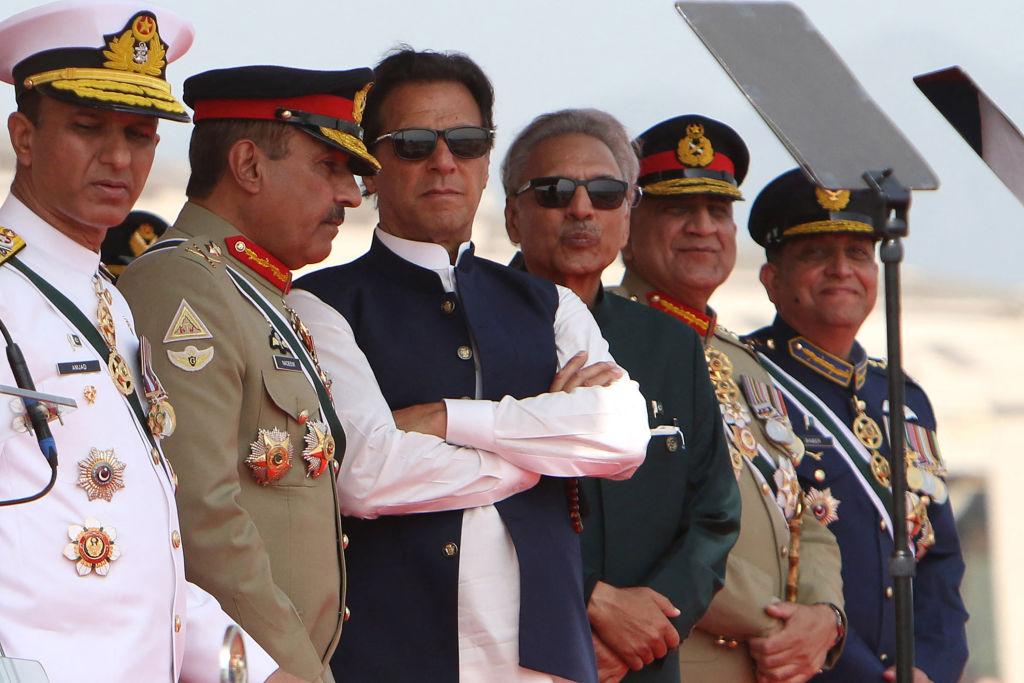
Among all the nuclear-armed states, Pakistan is the most fragile. The country keeps lurching from one crisis to another. The latest arises from the election commission’s banning of the former but popular Prime Minister Imran Khan from holding public office. Khan has vowed to fight the ban to the bitter end, putting him at odds with Pakistan’s powerful military whose favour he has lost. This power struggle may change Pakistan’s political paradigm.
Khan was deposed last April in a parliamentary vote of no confidence by a coalition of the Pakistan Democratic Movement, formed by a number of right and centre-left parties in 2020 and led by Shehbaz Sharif (a former chief minister of Punjab province and brother of ex–prime minister Nawaz Sharif). After some of the coalition members of Khan’s Pakistan Tehreek-e-Insaf party defected to the opposition, Khan lost his majority.
He has blamed his loss of power on a US-led conspiracy against him because of his independent foreign policy and for not following Washington on regional and international issues. While increasingly sounding critical of the US and holding Washington responsible for the plight of Afghanistan under the Pakistan-backed Taliban rule, he has not substantiated his claim. Reportedly, the main reason for Khan’s downfall was that his relations fractured with the military over the appointment of the head of the military intelligence agency Inter-Services Intelligence, or ISI, in October 2021.
The military has ruled Pakistan directly and indirectly for most of its existence since the country’s creation in 1947, with a pervasive role in every aspect of the nation’s life. Irrespective of one’s criticisms, the military has also been instrumental in holding together Pakistan’s five disparate national groups—the Punjabis, Sindhis, Baluchis, Pathans (whose kindred are called Pashtuns on the Afghanistan side of the border) and Muhajirs (those who migrated from British India during partition). In popular rallies, the opposition claims that Khan has maligned state institutions, including the judiciary and the military.
The latest political upheaval besetting Pakistan comes against the backdrop of deep-seated conditions of instability. It reflects the plight of a country where no elected prime minister has ever completed a full term and where economic, financial and social decline; underclass poverty; pervasive corruption; and national fragmentation have grown to be the order of the day. Extreme political Islamism has not wielded much political power, but it has been a disruptive and costly player, as embodied in such groups as Tehrik-i-Taliban Pakistan, whose relations with Afghanistan’s ruling Taliban as a creature of Pakistan’s military (or, more specifically, ISI) must not be underestimated.
Pakistan’s founding father, Muhammad Ali Jinnah, had intended Sunni Islam and the Westminster system of governance to define Pakistan’s national identity and cohesion, but that was not to be. The military has used both institutions, though in the context of longstanding Indo-Pakistan hostilities, to cement a pivotal role in Pakistan’s domestic and foreign affairs. It has harvested whatever ideologically and geopolitically possible to enforce Pakistan’s ambitions in Afghanistan and close ties with oil-rich Saudi Arabia, as well as with China and the United States for strategic reasons when opportune.
The military has historically benefited from Saudi petrodollar aid and counted on China’s economic and military support in a common cause against India. In addition, from the time of the Soviet occupation of Afghanistan in the 1980s and then the US intervention in that country in the wake of the 11 September 2001 terror attacks, it enjoyed enormous American financial and military aid by claiming to be on the side of Washington in the ‘war on terror’, though at the same time it continued to back the Taliban as the force fighting American and allied troops in Afghanistan. To maintain Washington’s aid flow, it harboured the leader of al-Qaeda, Osama Bin Laden, next to its military academy in Abbottabad near Islamabad until he was discovered and killed by the US in a special operation in total secrecy from Pakistani authorities in 2011.
However, the military’s privileged entrenchment in and control of Pakistan are now challenged by Khan with unsurpassed popularity. The power struggle is going to be a test of will on both sides, but it’s eventuating at a time when there are rumours of growing tensions within the military itself. According to some Pakistani analysts, a split is brewing in the higher echelons of the military between those who think that it has gone too far in its treatment of Khan and those who are still determined to maintain control over the Pakistani state.
A majority of Pakistanis are now more concerned about the security of their country than ever before. A downturn in the military’s cohesion and national chaos and fragmentation in a nuclear-armed state carries dangerously unpredictable risks, unless Pakistan is financially and economically bailed out and a fair and free general election is held sooner rather than later.